- Home
- Gustave Aimard
The Indian Chief: The Story of a Revolution Page 25
The Indian Chief: The Story of a Revolution Read online
Page 25
CHAPTER XXV.
THE BEGINNING OF THE END.
It was night. In a small house at Guaymas, Louis and Valentine wereconversing by the light of a meagre candle, which only spread a smokingand trembling illumination. They were discussing the measures by whichto expedite the finale of the gloomy machinations in which GeneralGuerrero had managed to enfold them with diabolical cunning, whileCurumilla was peacefully sleeping in a corner of the room.
"I foresaw it," Valentine said. "Now it is too late to draw back. Wemust act energetically: if not, you are lost."
"Eh, my friend? I am so in every way."
"What! will you really break down when the hour of danger has pealed?"
"I do not fear it: it will be welcome. I should wish to die, brother."
"Come, be a man. Regain your courage, but make haste. Have you noticedthe arms and ammunition continually arriving? Believe me, we must makean end of it, one way or other, as speedily as possible."
"Yes, I know as well as you that the general is deceiving us; but thesevolunteers are not the men I had at Hermosillo. These fellows hesitateand are afraid. Their commandant is incapable of acting: he is avacillating, irresolute man. With such people we can achieve nothing."
"I am afraid so: still it is better to know at once on what you have todepend than to remain any longer in this state of uncertainty."
"Tomorrow the delegates will go and see the general."
"Let them go to the deuce: they will be at least certain of obtaining acategorical answer from him," Valentine said impatiently.
At this moment two light taps were heard at the street door.
"Who can arrive so late?" the count said. "I expect nobody."
"No matter; let us see," Valentine said. "It is often the case that thepeople we least expect are the most agreeable visitors."
And he went to open the door. It was scarce ajar ere a woman rushed intothe house, crying to the hunter in a voice rendered hoarse by terror,--
"Look, look! I am pursued!"
Valentine rushed out.
Although this woman was _tapada_--that is to say, her features werecompletely hidden by a rebozo--the count recognised her at once. Whatother woman but Dona Angela could come to see him in this way? It was,in reality, the general's daughter. The count received her half faintinginto his arms, laid her on a butaca, and began lavishing on her allthose attentions which her condition demanded.
"In Heaven's name, speak! What is the matter with you?" he exclaimed."What has happened?"
In a little while the young lady recovered, passed her hand over herforehead several times, and gazed at the count with an expression ofintense happiness.
"At length I see you again, my love!" she exclaimed as she burst intotears, and threw herself headlong into his arms.
Don Louis returned her caresses, and tried to calm her. The maiden wassuffering from a strange nervous excitement, her large black eyes werehaggard, her face pallid as that of a corpse, and her whole body wasagitated by a convulsive tremor.
"Tell me, my child, what is the matter with you? In Heaven's name,explain! I implore you, speak. Angela, speak, if you love me."
"If I love you, poor cherished one of my heart!" she said with a sigh asshe laid her hand in his. "If I love you! Alas! I love you to death, DonLouis; and this love will kill me."
"Speak not so, my well-beloved angel! Dispel these gloomy thoughts: letus only think of our love."
"No, Don Louis, I have not come to you to speak of love: I have come tosave you."
"To save me!" he said with feigned gaiety. "Do you believe me, then, tobe in great peril?"
"Don Louis, you are running an immense risk. Take heed of my words. Donot look at me so with a smile: tomorrow you will be a lost man. All themeasures are taken. I heard all: it is horrible! And that is the way Ilearnt your return to Guaymas, of which I was ignorant. Then I ran offmadly, wildly to you, in order to say to you, 'Fly, fly, Don Louis!'"
"Fly!" he repeated thoughtfully. "And you, Angela, must I lose you againthis time and for ever? No, I prefer death."
"I will go with you; for am I not your affianced, your wife in the sightof Heaven? Come, come, Don Louis, let us go--not lose a minute, asecond. Your black horse will carry us beyond pursuit in two hours. Buttake your weapons, for I was followed by a man as I came here from myfather's house."
She spoke with strange volubility, like a person talking in a fever. Thecount knew not what resolution to follow, when suddenly a loud noise washeard in the street, and the door, which was only leant to, flew wideopen.
"Save me, save me!" the poor child exclaimed, a prey to indescribableterror.
Don Louis bounded on his pistols, and placed himself resolutely beforeher.
"Oh, you shall come, you villain!" Valentine's voice was heard outside."You shall not escape me this time. Come, walk in, or I'll quicken yourmotions with my dagger."
And with a vigorous effort the hunter entered the room, dragging afterhim a man who made futile efforts to escape.
"Shut the door, Louis," Valentine continued. "And now, my worthy spy,show me your treacherous face, that I may be able to recognise youagain."
Curumilla had left the corner in which he had hitherto been sleeping.Without uttering a syllable he drew Dona Angela behind a mosquito net,which completely concealed her, and then rejoined his friends, candlein hand. All this while the prisoner offered an obstinate resistance toprevent his features being seen; but he did not say a word, contentinghimself with uttering hoarse and indistinct exclamations of rage. Atlength, after a long struggle, the stranger seemed to comprehend thatall his efforts would be in vain: he drew himself up, took off hiscloak, and crossed his arms on his chest.
"Well, look at me, as you insist on doing so," he said with a sarcasticaccent.
"Don Cornelio!" the Frenchmen exclaimed.
"Myself, gentlemen. How have you been since I last had the pleasure ofseeing you?" he continued with serpent coolness.
"Miserable traitor!" Valentine yelled as he rushed on him.
But the count checked him.
"Wait," he said.
"I betrayed you, it is true," Don Cornelio replied. "What next? I hadprobably a motive in doing so. I know you are going to say that youdid me many services. What does that prove, if you did me in a singleday more injury than all the good you did me during the course of ourrelations?"
"I did you an injury! You lie, you scoundrel!"
"Senor conde," Don Cornelio said with a haughty air, "I would remind youthat I am a gentleman, and will not allow you to address me in the wayyou are now doing."
"This wretch is mad, on my soul!" the count said with a smile of pity."Let him go, brother; he is unworthy of our anger: he only merits ourcontempt."
"Not so," Valentine sharply objected. "This man is the general's tool:we cannot let him go thus."
"What shall we do with him? Sooner or later we must release him."
"That is possible, but for the present we will hand him over to the careof Curumilla."
The Indian gave a nod of assent, and seizing Don Cornelio, led himaway. The latter allowed him to do so without offering the slightestresistance.
"We shall meet again, gentlemen," he said with a mocking smile.
The Indian looked at him in a very peculiar manner, and drew him intoanother room. Dona Angela then emerged from behind the curtain.
"I am waiting for you, Don Louis," she said.
The latter shook his head sadly.
"Alas!" he said, "I cannot fly: my life is not my own. I have sworn tomy comrades not to abandon them. Were I to fly, I should be a traitor."
Dona Angela went up to him and bent gracefully over him.
"Farewell, Don Louis," she said. "You are acting as a caballero. Followyour destiny. Your honour is as dear to me as to yourself. I wish itto be unspotted. I no longer insist. Farewell! Give me a kiss on theforehead: we shall not meet again till the day of our death."
All at once a cry was heard in t
he street, so horrible that the threepersons shuddered with terror. The door opened, and Curumilla stalkedin: his face was calm, and his step as measured as usual.
"You went out by the door of the corral then, chief?" Valentine askedhim.
"Yes."
"But what have you done with Don Cornelio?"
"Free," the Indian said.
"What! free?" Don Louis exclaimed.
"There must be something in the background," the hunter remarked. "Whydid you give him his liberty?"
Curumilla drew his knife from his waist belt, and the blade was red withblood.
"You need no longer fear him," he said.
"You have not killed him?" the three exclaimed simultaneously.
"No," he said. "He is dumb and blind."
"Oh!" they said with a gesture of horror.
Curumilla had simply scooped out Don Cornelio's eyes with his scalpingknife, and torn out his tongue; then he led him to the other end of thetown, and abandoned him to his fate. Valentine and Don Louis consideredit useless to address any reproaches to the chief, which could notrepair the evil, and which, indeed, the Araucano would not haveunderstood; consequently they refrained from any observation.
Dona Angela, in spite of the count's entreaties, would not consent tohim accompanying her on her return home. She withdrew, after whisperingin his ear the parting recommendation,--
"Take heed of tomorrow, Don Louis."
The count smiled, and she flew away like a bird, leaving behind her verysad and naked the little room which she had illumined for a short timewith her presence.
"Come," the count said, as he fell hack in a butaca so soon as she wasgone, "it seems that tomorrow will bring the finale: all the better.Still the man that takes me will have to pay dearly for it."
The next day, as had been arranged, the delegates of the volunteerswaited on the general, who received them in his usual way, lavishingprotestations and promises on them. The delegates pressed for asettlement, on which Don Sebastian, who was doubtlessly ready to dealthe blow he had so long meditated, changed his tone and dismissedthem, bidding them await his good pleasure. The delegates withdrew,exasperated by the roguery of the man in whom they had been so weakas to place confidence, and who now proved to them that he had beendeceiving them from the beginning.
The volunteers were anxiously expecting the answer their delegates wereto bring them. When the latter described what had taken place theirexasperation reached its height: the cry "To arms!" was raised, andeveryone prepared for fighting. The chief of the battalion completelylost his head.
"Bid them form a square," the count said to him. The order was obeyed.The count placed himself in the centre of the square, and raised hishand to command silence.
All were still: the moment was a solemn one, and all perceived it. Inspite of himself, a certain degree of hesitation was depicted on thecount's handsome face: not that he feared for himself personally, but hefelt that he was about to risk his last stake, and it would be decisive.Everyone had his eyes fixed upon him.
"You hesitate, count," an officer said to him. "Why did you join us,then? Are you no longer the man of Hermosillo?"
At this sharp remark a vivid blush suffused the count's cheek, and hetrembled with suppressed passion.
"No," he exclaimed, "no, by heavens! I do not hesitate. My friends,reflect: there is yet time. Remember that, the sword once drawn, webecome outlaws. What will you do?"
"Fight--fight!" the volunteers shouted, waving their weaponsenthusiastically.
The count drew himself up, unsheathed his sword, and brandished it overhis head.
"You wish it?" he shouted.
"Yes, yes!"
"Well, then, forwards! Long live France!"
"Long live France!" the volunteers replied.
The battalion, formed in four companies, resolutely left itsquarters, and proceeded at a quick step toward the Mexican barracks.Unfortunately, as we have said, a dissension had sprung up among theFrench. Many of them marched very unwillingly, being forced on by theircomrades. The chief of the battalion, too, though personally very brave,was not the man suited to attempt a _coup de main_ like the present one;and the count, through excess of delicacy, and in order to maintainunity of action, committed the fault of declining the command whenoffered to him by the officers and men.
The battalion proceeded toward the Mexican barracks by three differentroads. But General Guerrero had made his arrangements long before. Hehad shut himself up in these barracks with three hundred troops of theline. The neighbouring houses were crammed with civicos, while four gunscommanded the only approaches. The Frenchmen only amounted to threehundred men, one half of them discouraged, while the Mexicans werenearly two thousand.
Still the action began vigorously on all sides at once. The first chargewas admirable. The Mexican guns swept down the attacking party, andeffected a frightful carnage. Still the French held their ground, andcontinued to advance, supported by the example of the count, who walkedfifteen paces in advance of the column, with a rifle in one hand anda sword in the other, amid a hail-storm of bullets, shouting in hispowerful voice,--
"Forward! forward!"
All at once, the chief of the battalion, who ought to have supported theattack on the right, seeing his company decimated by canister, lost hishead completely, and fell back in disorder on the French quarters. Thecount tried in vain to rally the volunteers; disorder was beginning tospread among them, and all his efforts were powerless.
It was at this moment the count understood the fault he had committedby not accepting the chief command. Still the Mexican guns no longerfired, for the artillerymen were dead.
"Forward! Charge with the bayonet!" the count shouted; and he rushedonward, followed by Valentine and Curumilla, who did not remain an inchbehind. Some twenty volunteers dashed after him. The count rushed upto the wall of the barracks, which he succeeded in scaling, and stoodupright on the summit, exposed to the whole of the enemy's fire.
"Forward! forward!" he repeated.
His hat, pierced by balls, was blown off his head, and severalbayonet-thrusts tore his clothes. A terrible hand-to-hand contestcommenced. Unfortunately there were only fifteen Frenchmen altogether.After a heroic attempt to hold their ground they were compelled to giveway; but they fell back like lions, pace by pace, with their facesturned to the foe, and not ceasing to fight. The count howled withrage: tears of passion poured down his cheeks at seeing himself thusabandoned. He wished to die. But in vain did he throw himself into thethickest of the fight: his friends protected him, in spite of himself,against the blows dealt at him. At length the route commenced. The countbroke his sword, after a glance of powerless fury at his enemies, whom,had he been bravely supported, he would have conquered, and who thusescaped him.
Valentine and Curumilla dragged him down to the port; but the vesselwhich brought him had set sail during the combat. Flight was impossible.In this extremity only one house could offer a refuge to the conquered:it was that of the French agent, and the volunteers flocked to it.
Senor Pavo promised that all those who delivered their arms up to himshould be placed under the protection of the French flag. The count hadentered the house and thrown himself into a chair, insensible to allthat was said and done around him; but Valentine was watching.
"A moment," he said. "Senor Pavo, will the life of Count de PreboisCrance be saved?"
The Mexican looked craftily at the hunter, but made no answer.
"No shuffling, sir," Valentine continued. "We want a distinct answer, orwe shall renew the engagement."
As it was no longer possible to hesitate Senor Pavo spoke.
"Gentlemen," he said in a clear and distinct voice, "on my honour Iswear to you that the life of Count Louis de Prebois Crance shall bespared."
"We shall remember your words, sir," Valentine said sternly.
Don Antonio Pavo hoisted a white flag as a signal of peace. Nearly thewhole battalion of volunteers had sought refuge at his house. The battlewas o
ver; it had lasted three hours. The French had thirty-eight menkilled, and sixty-three wounded, out of three hundred combatants. TheMexicans lost thirty-five men during the action, and had one hundred andforty-seven wounded, out of about two thousand soldiers. The battlehad been warmly contested, and the conquerors paid dearly for a victorywhich was the result of treachery.
CHAPTER XXVI.
THE CATASTROPHE.
Immediately after the combat a delicious comedy, began between DonAntonio Pavo and General Guerrero. The latter would not listen to anyproposition tending to obtain for the French a written capitulation. Heconfined himself to giving his word of honour as a general officer, thatif the arms were surrendered to him at once, _all_ the rebels shouldhave their lives granted them. Don Antonio was constrained to yieldto the general's orders. The arms were surrendered, the French madeprisoners of war, and locked up.
So soon as night fell, Colonel Suarez, accompanied by four otherofficers, presented himself at the house of Don Antonio Pavo, demanding,in the name of General Guerrero, that the Count de Prebois Crance shouldbe immediately handed over to him. Don Antonio hastened to obey bygiving the count orders to quit his house. The latter, without replying,contented himself with darting a glance of sovereign contempt at him,and surrendered to the colonel. A quarter of an hour later he was insolitary confinement. Of all the combatants only two had escaped,Valentine and Curumilla, and that was only at the count's peremptoryorder.
We repeat it here, although the names are changed, and certain factshave, been expressly altered, we are not writing a romance, but thehistory of a man whose noble character must be dear to all his fellowcountrymen. There are, then, certain things which we cannot and oughtnot to pass over in silence, though frequently in the course of thislong narrative we have softened down facts which we felt a repugnance todisplay in all their horror.
Despite the solemn promise made by Don Antonio Pavo in the presence ofall the volunteers, a few days after his illegal arrest the count wastold to prepare for trial. The Europeans were aroused by this disloyalact, and several of them went to Don Antonio to remind him of hispromise, and incite him to keep it Then Don Antonio asserted that henever made any promise, and that the affair in no way concerned him.
In the meanwhile the preparations for the count's trial were activelypushed on. All the officers of the battalion, including the commandant,were interrogated, and all, with one exception, we are compelled toconfess, sought to throw the whole blame of their conduct on the count.Not a single witness for the defence was examined; for what was the useof it? The accused was condemned beforehand.
When the count was arrested he still had in his waist belt the pistolswith which he marched into action. General Guerrero ordered thatthey should be left him. He doubtless hoped that Louis, impelled bydespair, would, in a moment of terror, blow out his brains, and thusspare himself the shame of signing the death warrant. But he was notacquainted with the character of his enemy. The count possessed a mindtoo strongly tried by that touchstone called misfortune to have recourseto suicide, and tarnish the end of his career.
In the meanwhile Valentine had not been inactive. If he had consentedto preserve his liberty, it was only in the hope of saving hisfoster-brother. Two or three days before the count's secret imprisonmentwas altered, toward evening, the door of his cell opened. He turned hishead mechanically to see who entered, uttered a cry of joy, and rushedtoward him. The newcomer was Valentine.
"You--you here!" he said to him. "Oh, thanks for coming!"
"Did you not expect me, brother?" the hunter asked.
"I expected your visit, though I did not dare count on it. You must beexposed to a thousand annoyances, and compelled to conceal yourself?"
"I! Not a bit of it."
"All the better; you cannot imagine how happy I am at seeing you. Butwho is the person accompanying you?"
In truth, Valentine was not alone; another person had entered the cellwith him, and was standing motionless against the door, which the jailerlocked again, after introducing the visitors.
"Do not trouble yourself about that person at present," Valentine said;"let us talk about business."
"Be it so: speak."
"You know that you will be condemned to death. I suppose?"
"I presume so."
"Good! Now listen to me, and, above all, do not interrupt me; for timeis precious, and we must profit by it. You understand that if I obeyedyou when you ordered me to escape, I did so because I suspected in whatway affairs would turn. Now the moment for action has arrived. All isprepared for your flight; the jailers are bought--they will not see youquit the prison. I have freighted a vessel. Take your hat, and come. Inten minutes we shall be aboard, in half an hour under sail, and we willleave Mexican justice to deal with you in your absence. Come, I havemanaged capitally, I think, brother. You see that I have lost no time,and all this is very simple."
"Extremely simple indeed," the count replied with the utmost calmness."I thank you for what you have done for me."
"Indeed, brother, it is not worth thanking for."
The count laid his hand on his arm to interrupt him.
"But," he continued, "I cannot accept your offer."
"What!" Valentine exclaimed with a start of surprise. "What do you say,brother? You must be jesting."
"Not at all, brother. What I say is the truth. It is my inflexible willto leave to the Mexican people the iniquity of my condemnation, theindelible stain of my death. I will not fly: I cannot--I ought not; forit would be an act of cowardice on my part. A soldier does not abandonhis post. A gentleman does not sully his escutcheon. A Frenchman has notthe right to dishonour his name. I die for a noble and grand idea--theemancipation and regeneration of a people. That idea required a baptismof blood to make it prosper and bear fruit at a later date. I give itmine without regret--without a thought of self, gladly--I will sayalmost with happiness. Brother, in a prison thoughts ripen quickly: itis probably because a man is nearer the tomb there, and life appears tohim what it really is--a dream. I have thought much. I have reflecteddeeply. I have weighed with the utmost impartiality the for and againstof the two questions, and I prefer death. I knew what you would attemptfor me. Your life has been one long devotion; but that devotion mustthis night accomplish its greatest sacrifice in letting me die, andnot attempting to save me. A man like I am must not secure his life bytrickery. I pledged my head as the stake in the game I played. I lost,and I pay my debt."
"Brother, brother, do not speak so!" Valentine exclaimed with despair;"you break my heart."
"Reflect, my good Valentine, on the position in which I now stand. I amtried contrary to the law of nations. Hence my position is a fine one;my judges will endure all the disgrace of my condemnation. If I fly,I shall be nothing more than any common adventurer--a pirate, as theycall me, prodigal of his companions' blood, and chary of his own. Must Inot acquit the debt I have contracted with all my friends, who died todefend my cause? Come, brother, do not try to convince me, for it wouldbe useless. I repeat to you, my resolution cannot be shaken."
"Ah!" Valentine exclaimed again, with an outburst of passion he couldnot repress, "you are determined to die. But do you reflect that, indying, you drag down with you to the grave another person? Do youbelieve that she will consent to live when----"
"Silence!" the count interrupted him in great agitation. "Do not speakto me of her. Poor Angela! Alas! why did she love me?"
"Why!" the person who accompanied Valentine, and had hitherto remainedmotionless, exclaimed. "Because you are great, Louis; because your heartis immense."
"Oh!" he said with grief, "Angela! Brother, brother, what have you done?"
The hunter made no reply, for he was weeping. His iron nature wasbroken; the strong man wept like a child.
"Do not reproach him for having brought me, Don Louis. I wished tocome--I insisted on accompanying him."
"Alas!" the count replied with an ineffable sadness, "you break myheart, poor darling child. In your presen
ce all my resolution andcourage abandon me. Oh! why have you come to revive, by your presence,regrets which nothing will be able to calm again?"
"You are mistaken, Don Louis," she said with febrile energy. "Youbelieve me to be a weak woman, without courage. My love for you is tootrue and too pure for me ever to advise you to do anything against yourhonour or your glory. Just now, concealed in that obscure corner, Ilistened eagerly to your words. I was happy at hearing you speak as youdid. I love you, Don Louis, oh, as man never was loved in this world!But I love you for yourself, and not for myself. Your glory is as dearto me as you are. Your memory must remain without a stain, as your lifehas been unsullied. Don Louis, I, to whom you are all in all, the manfor whom I would sacrifice my life if necessary, I have come to say toyou, 'Dear count, die nobly, with head erect: fall like a hero! Yourmemory will be revered as that of a martyr.'"
"Yes, thanks, thanks for saying that to me, Angela," the count said ashe pressed her in his arms with passionate energy; "you restore me allmy energy."
"And now farewell, count, to meet again soon."
The count went up to Valentine.
"Your hand, brother," he said to him. "Forgive me for not desiring tolive."
The hunter threw himself into his brother's arms, and the two remainedthus enfolded for several minutes. At length the count liberated himselffrom this loving prison by a heroic effort. Valentine left the cell, nothaving the strength to utter a word, and supporting Dona Angela, who, inspite of the courage she had displayed, felt on the point of fainting.
The door closed again, and the count remained alone. He fell backin his chair, leaned his elbows on the table, buried his face in hishands, and remained in this position the whole night through. The nextmorning, at an early hour, Don Louis was fetched to go to the court. Theinterrogatory was over, and the pleading was about to begin.
The count had chosen as his defender a young captain of the name ofBorunda, who during the siege of Hermosillo had been taken prisoner bythe French at the attack on the bridge head. Borunda had remembered thegenerous manner in which the count had treated him at that period. Hispleading was what might be expected from the young and noble officer,simple, pathetic, and imprinted with that eloquence which comes fromthe heart, and nothing can equal. Assuredly the count would have beenacquitted, had not his death been decided beforehand.
Don Louis, who during the entire discussion remained calm and apathetic,listening to the false statements and calumnious imputations of thewitnesses without quivering, or addressing a reproach to those ingrateswho sacrificed him in this cowardly way, felt affected by his defender'sglowing language. He rose and held out his hand to him with inimitablegrace.
"Thank you, sir," he said to him. "I am happy at having found a man likeyourself among so many enemies. Your pleading was as it should be, andmoney will not repay such words."
Then, drawing from his finger the ring bearing his coat of arms, whichhe had always worn since leaving France, he passed it on to thecaptain's finger, adding,--
"Accept this ring, and keep it in remembrance of me."
The captain pressed his hand, but could not reply.[1]
The judges retired to deliberate. They returned at the expiration offive minutes. Count Louis de Prebois Crance, unanimously found guilty,was condemned to be shot. The sworn interpreter of the court was thencalled on by the president to translate the sentence to the condemned;but then a strange incident occurred. This interpreter rose andaddressed the court.
"No, gentlemen," he said resolutely; "I will not translate this unjustsentence, which you will soon regret having pronounced."
This energetic protest abashed the judges for an instant. Theinterpreter was discharged on the spot. He was a Spaniard.
"Gentlemen," the count then said with the greatest coolness, "Iunderstand your language sufficiently well to know that you havecondemned me to death. May Heaven pardon you, as I do!"
He bowed to the judges with a smile, and withdrew as calm as he entered.
The count was immediately placed in _capilla_. It is the fashion inSpain and all Southern America for men condemned to death to be placedin a room, at one end of which is an altar. Near the bed stands thecoffin in which the body of the condemned will be laid after theexecution. The walls are hung with black cloth, on which silver tearsand mournful inscriptions are sewn. This custom, which is very cruel inour opinion, and is evidently a relic of the barbarous medieval times,is probably intended to imbue the condemned with religious ideas.
The count was in no way influenced by these mournful trappings, butemployed himself with the utmost tranquillity in setting his affairsin order. The very day he was put in _capilla_ Valentine entered hiscell, followed by Father Seraphin. He was the priest he would mostcertainly have sent for to console him in his last moments, had he knownwhere to find him; but Valentine thought of everything. By his ordersCurumilla went on the search, and the worthy Indian soon discovered themissionary, who, on learning the nature of the case, hastened to followhim.
Still the condemnation of the count had produced an extraordinaryemotion. While the civicos and other bandits of the town indulged inindecent joy, parading the streets with bands of music at their head,the upper classes and sound portion of the population displayed extremesorrow. They spoke of nothing less than preventing the execution of thesentence, and for some hours General Guerrero trembled lest his victimshould escape him.
The Vice-Consul of the United States, indignant at this unjust sentence,but not having the power to act officially, proceeded to Don AntonioPavo with the hope of inducing him to act energetically, and save thecount. Don Antonio refused. While protesting the sorrow he felt, nothingcould make him recall his refusal.
Still Don Antonio understood that he could not refrain from paying avisit to the count. Valentine was with him, as well as Father Seraphin.The hunter had obtained leave to remain with his foster brother tillthe last moment. The count received Don Antonio with an icy face.He contented himself with shrugging his shoulders in contempt whenthe latter tried to exculpate himself, and alleviate all that wasreprehensible in his conduct. The count handed him several papers, and,interrupting him roughly in the midst of a very involved sentence, inwhich he was trying to prove how innocent he was of all imputed to him,said dryly,--
"Listen to me, sir. I am willing, if it is of any use to you, to giveyou a letter, in which I acknowledge that your conduct toward me wasalways irreproachable; but on one condition----"
"What is it, sir?" he asked eagerly.
"I do not wish to be shot on my knees, and with my eyes bandaged. Youunderstand me, sir? I want to look death in the face. Go and arrangethat with the governor."
"That favour shall be granted you, I can assure you, sir," he answered,delighted at having been let off so easily.
He went out and kept his word. What did the count's enemies care whetherhe fell standing or on his knees, with eyes bandaged or not? Their greatobject was that he should be dead. Still General Guerrero profited bythis opportunity to appear generous at a small cost.
The next day but one Valentine brought Dona Angela with him: the maidenhad donned that monk's robe which she had already worn under criticalcircumstances.
"Is it for today?" the count asked.
"Yes," Valentine answered.
Louis took his foster-brother on one side.
"Swear to me to protect that child when I am no longer here to do so."
"I swear it!" Valentine said in a broken voice.
Dona Angela heard the words. She smiled sadly as she wiped away a tear.
"Now, brother, there is another oath I must obtain from you."
"Speak, brother."
"Swear to do what I ask you, whatever it may be."
Valentine looked at his foster-brother: he saw such anxiety depicted onhis face that he let his eyes fall.
"I swear it!" he said in a hollow voice.
He had guessed what Don Louis was about to demand of him.
"I do not wi
sh you to avenge me. Believe me, brother, God will take thatvengeance on Himself, and sooner or later punish my enemies in a moreterrible manner than you can do. Do you promise to obey me?"
"You have my word, brother," the hunter answered.
"Thanks! Now let me say good-by to this poor girl."
And he walked toward Dona Angela, who advanced to meet him. We will notdescribe their conversation. They forgot everything during an hour tolive an age of joy by isolating themselves, and speaking heart to heart.Suddenly a loud noise was heard outside, the door of the capilla opened,and Colonel Suarez appeared.
"I am at your orders, colonel," the count said, not giving the othertime to speak.
He passed his fingers for the last time through his moustache, smoothedhis hair, took up his Panama straw hat, which he held in his hand, andafter taking a melancholy glance around, went out.
Father Seraphin walked on his right; Dona Angela, with the hood over herhead, on his left. Valentine came next, tottering like a drunken man, inspite of all the efforts he made, with haggard eyes, and face bathed intears. There was something heart-rending in the aspect of this man, withthe energetic features and bronzed face, a prey to such grief, which wasthe more profound because it was silent.
It was six in the morning, the sun had just risen, the dawn wasmagnificent, the atmosphere was filled with perfume, nature seemedrejoicing, and a man full of life, health, and intellect was about todie--die brutally, struck by unworthy foemen.
An immense crowd covered the place of execution, and the troops weredrawn up in battle array. General Guerrero, in full uniform, glisteningwith precious stones, appeared at the head of the troops.
The count walked slowly, talking with the missionary, and from time totime addressing a word to the heroic girl, who refused to abandon him atthis supreme hour. He held his hat before his face to protect him fromthe sunbeams, and fanned himself carelessly. On reaching the executionground he stopped, went in the direction of the firing party, threw hishat on the ground, and waited.
An officer read his sentence. When this was over, the countaffectionately embraced the missionary, did the same to Valentine, andwhispered in his ear,--
"Remember!"
"Yes," the latter said in an inarticulate voice.
Then came the turn of Dona Angela. They remained for a long time in aclose embrace, and then separated as if by mutual agreement.
"Though separated on the earth, we shall soon be united in heaven.Courage, my beloved!" she said with exaltation.
He replied to her with a smile which had nothing earthly about it.
Father Seraphin and Valentine fell back about fifteen paces, knelt downon the ground, and folded their hands in prayer. Dona Angela, with thecowl still over her face, placed herself only a few paces from thegeneral, who watched all the preparations for the execution with atriumphant smile.
The count looked around him to assure himself that his friends hadretired, took a step forward nearer the firing party, from which he wasonly eight yards, and laying his hands behind his hack, with head erect,a smile on his lips, and a resolute glance, he called out in a clear,impressive voice,--
"Come, my brave fellows, do your duty! Aim at the heart!"
Then a strange event occurred. The officer stammered as he gave theorder to fire; and the soldiers, firing one after the other, did not hitthe sufferer.
"Enough of this, caray!" the general shouted.
The soldiers reloaded their muskets, and the order to fire was givenonce more. A discharge burst forth like thunder, and the count fell withhis face to the earth.
He was dead: progress counted one martyr more!
"Farewell, father," a voice cried in the general's ear. "I keep mypromise."
Don Sebastian turned in terror, for he had recognised his daughter'svoice.
Dona Angela had fallen to the ground. Her father rushed toward her. Itwas too late; he only pressed a corpse in his arms. His punishment hadalready commenced.
The count had scarce fallen ere Valentine rushed toward him, followed bythe missionary.
"Let no one approach the body!" he said in a voice which made thebravest recoil, and kneeling on his right, while the missionary placedhimself on the left, he prayed.
Curumilla had disappeared.
Those who tell us that the Count de Prebois Crance was an adventurer, Iwill merely ask what Hernando Cortez was on the day before the fall ofMexico?
In politics, as in everything else, the end justifies the means, andsuccess is only the consecration of genius.
[1] We are delighted to be able to state that Captain Borunda, in spiteof the brilliant offers afterwards made him, would not consent to partwith this ring.--G.A.
NOTE.
Several of our friends have remarked to us with truth that the workof justice we have attempted in this work would be incomplete if weinsisted on concealing our characters under their pseudonyms. We will,therefore, obey our friends' wishes. Who does not remember the heroicepisode of Count Gaston de Raousset-Boulbon's life? The incident thatterminated it was, in spite of the political preoccupations of themoment, considered a public calamity.
It is the expedition of this great soldier, who only lacked a lever tooverturn a world, that we have attempted to describe. Don Louis is thecount. By the side of Consul Calvo, General Yanes, and the CommandantLebourgeois-Desmarets, a sinister trinity fatal to the count, thefirst two through a mean hatred, the third through jealousy, also grinthe ignoble and gloomy faces of Colonel Campusano and Cubillas, thosesubaltern agents, the buzzards who were less hideously ferocious thanthe men who urged them to action. Now let us mention hap-hazard thenames of the few men who remained faithful to the count at all risks.In the first rank we will name Monsieur A. de la Chapelle, editorin chief of the _Messager de San Francisco,_ a private friend ofRaousset, who left him at his death the duty of avenging his memory,and whom friendship inspired to write so fine a book; then Lenoir,Gamier, Fayolle, and Lefranc, of whom the last three fell bravelybefore Hermosillo; O. de la Chapelle, brother of the journalist, thatchivalrous chief of the Cocosperians; lastly, the Mexican captain,Borunda, whose chivalrous pleading would have saved the count, had nothis death been resolved on.
Twelve years have passed over the drama of Guaymas, and the hour hasarrived to do proper justice to the heroic victim of that unjustifiableassassination. We, one of his obscurest friends, will be pleased ifour book, so incomplete as it may be, aids to any extent, howeverslight, in effecting this rehabilitation so eagerly expected by allhonest hearts. We will add in conclusion, that the narrative has beenundertaken without any notes being prepared beforehand, and writtenunder the impression of ineffaceable memories, rather with the heartthan with the pen.
GUSTAVE AIMARD.
THE END.

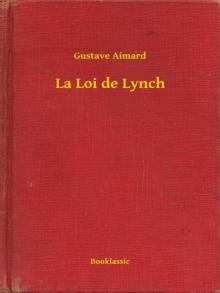 La loi de lynch. English
La loi de lynch. English The Guide of the Desert
The Guide of the Desert The Trail-Hunter: A Tale of the Far West
The Trail-Hunter: A Tale of the Far West The Pirates of the Prairies: Adventures in the American Desert
The Pirates of the Prairies: Adventures in the American Desert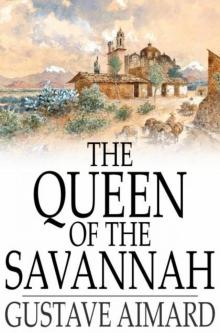 The Treasure of Pearls: A Romance of Adventures in California
The Treasure of Pearls: A Romance of Adventures in California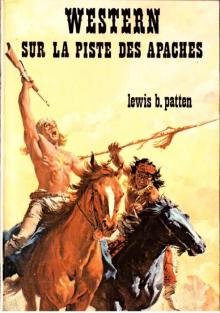 Les outlaws du Missouri. English
Les outlaws du Missouri. English Les trappeurs de l'Arkansas. English
Les trappeurs de l'Arkansas. English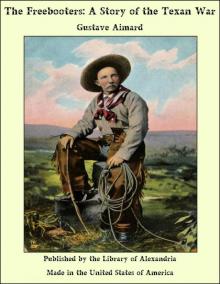 The Border Rifles: A Tale of the Texan War
The Border Rifles: A Tale of the Texan War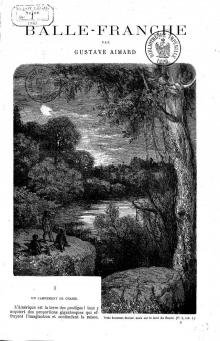 Balle-Franche. English
Balle-Franche. English The Queen of the Savannah: A Story of the Mexican War
The Queen of the Savannah: A Story of the Mexican War The Red Track: A Story of Social Life in Mexico
The Red Track: A Story of Social Life in Mexico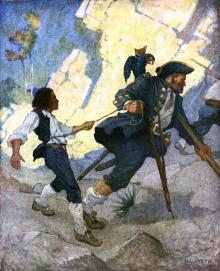 La fièvre d'or. English
La fièvre d'or. English The Pearl of the Andes: A Tale of Love and Adventure
The Pearl of the Andes: A Tale of Love and Adventure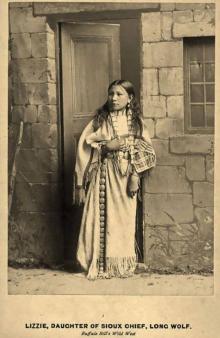 Les fils de la tortue. English
Les fils de la tortue. English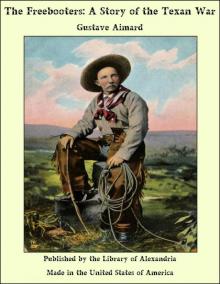 The Indian Chief: The Story of a Revolution
The Indian Chief: The Story of a Revolution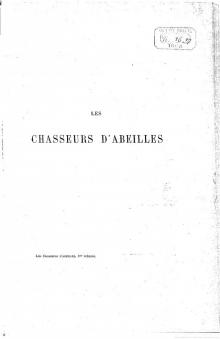 Les chasseurs d'abeilles. English
Les chasseurs d'abeilles. English The Adventurers
The Adventurers